
Sudan, officially the Republic of the Sudan, is a country in Northeast Africa. It is bordered by the Central African Republic to the southwest, Chad to the west, Egypt to the north, Eritrea to the northeast, Ethiopia to the southeast, Libya to the northwest, South Sudan to the south and the Red Sea. It has a population of 45.7 million people as of 2022 and occupies 1,886,068 square kilometres, making it Africa's third-largest country by area, and the third-largest by area in the Arab League. It was the largest country by area in Africa and the Arab League until the secession of South Sudan in 2011, since which both titles have been held by Algeria. Its capital city is Khartoum and its most populous city is Omdurman.

The history of Sudan refers to both the territory of the Republic of the Sudan, including what became in 2011 the independent state of South Sudan. The territory of Sudan is geographically part of a larger African region, also known by the term "Sudan". The term is derived from Arabic: بلاد السودان bilād as-sūdān, or "land of the black people", and has sometimes been used more widely referring to the Sahel belt of West and Central Africa.

Currently, the politics of Sudan takes place in the framework of a federal provisional government. Previously, a president was head of state, head of government, and commander-in-chief of the Sudanese Armed Forces in a de jure multi-party system. Legislative power was officially vested in both the government and in the two chambers, the National Assembly (lower) and the Council of States (higher), of the bicameral National Legislature. The judiciary is independent and obtained by the Constitutional Court. However, following a deadly civil war and the still ongoing genocide in Darfur, Sudan was widely recognized as a totalitarian state where all effective political power was held by President Omar al-Bashir and his National Congress Party (NCP). However, al-Bashir and the NCP were ousted in a military coup which occurred on April 11, 2019. The government of Sudan was then led by the Transitional Military Council or TMC. On 20 August 2019, the TMC dissolved giving its authority over to the Sovereignty Council of Sudan, who were planned to govern for 39 months until 2022, in the process of transitioning to democracy. However, the Sovereignty Council and the Sudanese government were dissolved in October 2021.

Omar Hassan Ahmad al-Bashir is a Sudanese former military officer and politician who served as the seventh head of state of Sudan under various titles from 1989 until 2019, when he was deposed in a coup d'état. He was subsequently incarcerated, tried and convicted on multiple corruption charges. He came to power in 1989 when, as a brigadier general in the Sudanese Army, he led a group of officers in a military coup that ousted the democratically elected government of prime minister Sadiq al-Mahdi after it began negotiations with rebels in the south. He was elected three times as president in elections that have been under scrutiny for electoral fraud. In 1992, al-Bashir founded the National Congress Party, which remained the dominant political party in the country until 2019. In March 2009, al-Bashir became the first sitting head of state to be indicted by the International Criminal Court (ICC), for allegedly directing a campaign of mass killing, rape, and pillage against civilians in Darfur. On 11 February 2020, the Sudanese government announced that it had agreed to hand over al-Bashir to the ICC for trial.
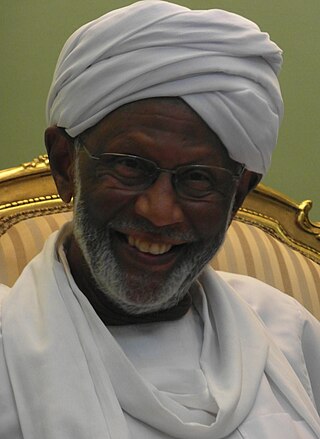
Hassan 'Abd Allah al Turabi was a Sudanese Islamist politician who was considered "the true architect" of the 1989 coup that brought Omar al-Bashir to power. He has been called "one of the most influential figures in modern Sudanese politics" and a "longtime hard-line ideological leader". He was instrumental in institutionalizing sharia in the northern part of the country and was frequently imprisoned in Sudan, but these "periods of detention" were "interspersed with periods of high political office".
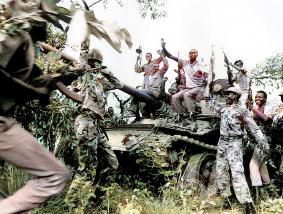
The Second Sudanese Civil War was a conflict from 1983 to 2005 between the central Sudanese government and the Sudan People's Liberation Army. It was largely a continuation of the First Sudanese Civil War of 1955 to 1972. Although it originated in southern Sudan, the civil war spread to the Nuba mountains and the Blue Nile. It lasted for 22 years and is one of the longest civil wars on record. The war resulted in the independence of South Sudan six years after the war ended.

The First Sudanese Civil War was a conflict from 1955 to 1972 between the northern part of Sudan and the southern Sudan region that demanded representation and more regional autonomy. Half a million people died over the nearly 17 years and the war was divided into four major stages: initial guerrilla warfare, the creation of the Anyanya insurgency, political strife within the government and establishment of the South Sudan Liberation Movement.

Salva Kiir Mayardit, also known as Salva Kiir, is a South Sudanese politician who has been the President of South Sudan since its independence on 9 July 2011. Prior to independence, he was the President of the Government of Southern Sudan, as well as First Vice President of Sudan, from 2005 to 2011. He was named Commander-in-Chief of the Sudan People's Liberation Army (SPLA) in 2005, following the death of John Garang.
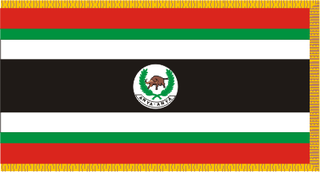
The Anyanya were a southern Sudanese separatist rebel army formed during the First Sudanese Civil War (1955–1972). A separate movement that rose during the Second Sudanese Civil War were, in turn, called Anyanya II. Anyanya means "snake venom" in the Ma'di language.
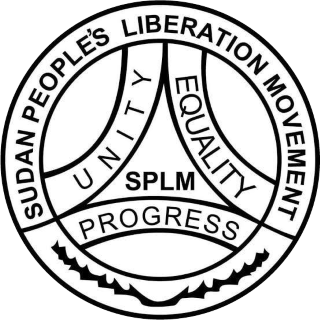
The Sudan People's Liberation Movement is a political party in South Sudan. It was initially founded as the political wing of the Sudan People's Liberation Army in 1983. On January 9, 2005 the SPLA, SPLM and Government of Sudan signed the Comprehensive Peace Agreement, ending the civil war. SPLM then obtained representation in the Government of Sudan, and was the main constituent of the Government of the then semi-autonomous Southern Sudan. When South Sudan became a sovereign state on 9 July 2011, SPLM became the ruling party of the new republic. SPLM branches in Sudan separated themselves from SPLM, forming the Sudan People's Liberation Movement-North. Further factionalism appeared as a result of the 2013-2014 South Sudanese Civil War, with President Salva Kiir leading the SPLM-Juba and former Vice President Riek Machar leading the Sudan People's Liberation Movement-in-Opposition.

The War in Darfur, also nicknamed the Land Cruiser War, was a major armed conflict in the Darfur region of Sudan that began in February 2003 when the Sudan Liberation Movement (SLM) and the Justice and Equality Movement (JEM) rebel groups began fighting against the government of Sudan, which they accused of oppressing Darfur's non-Arab population. The government responded to attacks by carrying out a campaign of ethnic cleansing against Darfur's non-Arabs. This resulted in the death of hundreds of thousands of civilians and the indictment of Sudan's president, Omar al-Bashir, for genocide, war crimes, and crimes against humanity by the International Criminal Court.

The Comprehensive Peace Agreement, also known as the Naivasha Agreement, was an accord signed on January 9, 2005, by the Sudan People's Liberation Movement (SPLM) and the Government of Sudan. The CPA was meant to end the Second Sudanese Civil War, develop democratic governance countrywide, and share oil revenues. It also set a timetable for a Southern Sudanese independence referendum.
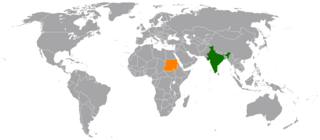
India–Sudan relations, also called Indian-Sudanese relations or Indo-Sudanese relations, refers to the international relations that exists between India and Sudan.

The 2011–2013 protests in Sudan began in January 2011 as part of the Arab Spring regional protest movement. Unlike in other Arab countries, popular uprisings in Sudan had succeeded in toppling the government prior to the Arab Spring in 1964 and 1985. Demonstrations in Sudan however were less common throughout the summer of 2011, during which South Sudan seceded from Sudan, but resumed in force later that year and again in June 2012, shortly after the government passed its much criticized austerity plan.

The Sudanese conflict in South Kordofan and Blue Nile was an armed conflict in the Sudanese southern states of South Kordofan and Blue Nile between the Sudanese Army (SAF) and Sudan People's Liberation Movement-North (SPLM-N), a northern affiliate of the Sudan People's Liberation Movement (SPLM) in South Sudan. After some years of relative calm following the 2005 agreement which ended the second Sudanese civil war between the Sudanese government and SPLM rebels, fighting broke out again in the lead-up to South Sudan independence on 9 July 2011, starting in South Kordofan on 5 June and spreading to the neighboring Blue Nile state in September. SPLM-N, splitting from newly independent SPLM, took up arms against the inclusion of the two southern states in Sudan with no popular consultation and against the lack of democratic elections. The conflict is intertwined with the War in Darfur, since in November 2011 SPLM-N established a loose alliance with Darfuri rebels, called Sudan Revolutionary Front (SRF).

South Sudan, officially the Republic of South Sudan, is a landlocked country in Eastern Africa. It is bordered by Ethiopia, Sudan, the Central African Republic, the Democratic Republic of the Congo, Uganda, and Kenya. Its population was estimated at 10,913,164 in 2022. Juba is the capital and largest city.

The Sudanese Revolution was a major shift of political power in Sudan that started with street protests throughout Sudan on 19 December 2018 and continued with sustained civil disobedience for about eight months, during which the 2019 Sudanese coup d'état deposed President Omar al-Bashir on 11 April after thirty years in power, 3 June Khartoum massacre took place under the leadership of the Transitional Military Council (TMC) that replaced al-Bashir, and in July and August 2019 the TMC and the Forces of Freedom and Change alliance (FFC) signed a Political Agreement and a Draft Constitutional Declaration legally defining a planned 39-month phase of transitional state institutions and procedures to return Sudan to a civilian democracy.

Abdel Fattah Abdelrahman al-Burhan is a Sudanese army general who is the de facto ruler of Sudan. Following the Sudanese Revolution in April 2019, he was handed control of the military junta, the Transitional Military Council, a day after it was formed, due to protesters' dissatisfaction with the establishment ties of initial leader Ahmed Awad Ibn Auf. He served as chairman of the TMC until a draft constitutional declaration signed with civilians went into effect in August 2019, and a collective head of state Transitional Sovereignty Council was formed, also to be initially headed by al-Burhan.

Binaa Sudan Party, abbreviated BSP, is a political party in Sudan. Established February 2018 following an invitation from the Sudanese Shadow Government, a group of youth professionals who joined together to form a non-ideological organisation to produce a practical manifesto to put solutions for Sudan's state problems. Binaa Sudan Party is a Transpartisan organization. BSP has signed the Deceleration of Freedom and Change, which is an alliance that initiated and led the topple of Omar Al-Bashir in 2019.

On 25 October 2021, the Sudanese military, led by General Abdel Fattah al-Burhan, took control of the government in a military coup. At least five senior government figures were initially detained. Civilian Prime Minister Abdalla Hamdok refused to declare support for the coup and on 25 October called for popular resistance; he was moved to house arrest on 26 October. Internet outages were reported. Later the same day, the Sovereignty Council was dissolved, a state of emergency was put in place, and a majority of the Hamdok Cabinet and a number of pro-government supporters were arrested. As of 5 November 2021, the list of those detained included "government ministers, members of political parties, lawyers, civil society activists, journalists, human rights defenders, and protest leaders", who were held in secret locations, without access to their families or lawyers.


















